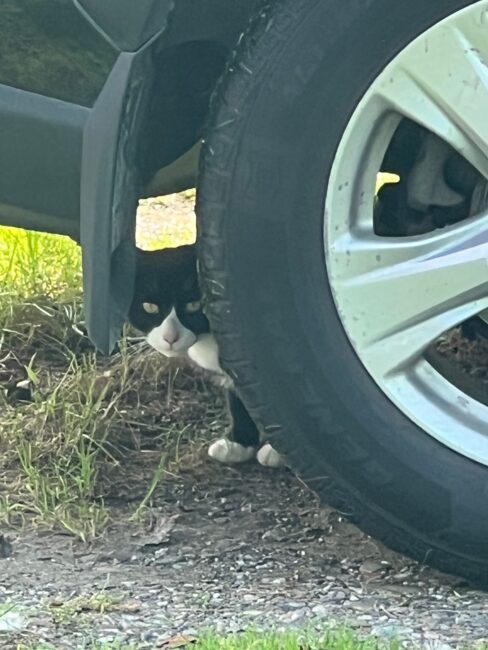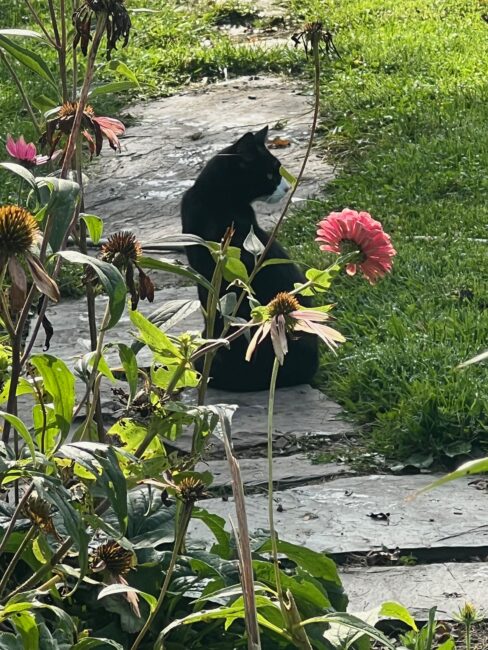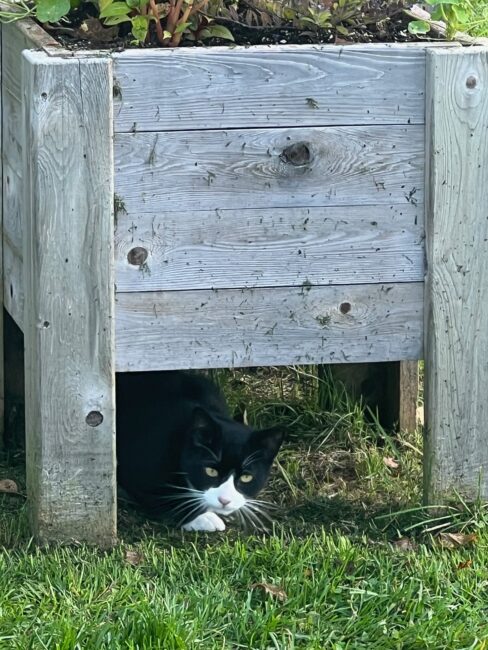Zip is a living window into how cats work their way into the hearts and lives of human beings, even as they mostly balk at completely surrendering their affection to the people they live with. People seem to have no trouble offering their hearts and souls to cats. Darwin got it right: alone among the many animal species, dogs and cats have figured out how to play us, and we have figured out how to play them.
Everyone calls it love, and it does feel good. But it’s much more than love; Zip will help me understand why. He already is.
As someone who has written extensively about attachment theory and how it relates to us and our animals, I find Zip fascinating to watch and love. I’m also pleased that he loves me in return. We are suitable for one another.
To help me study this new turn in my animal life, I’ve been turning to the British Anthrozoologist John Bradshaw and his fascinating book “The Animals Among Us, The New Science of Anthrozoology” (or why people love their domestic pets so much). It feels like Zip is taking over every part of the farm.
Zip exploring the space under my car’s tires.
We accept that we love our pet animals, but few animal lovers that I know of think about why that is so when we ignore so many troubled animals and permit so many species to die. We build McMansions and condominiums worldwide while countless animals lose their habitats and are condemned to die by starvation execution or poachers.
We are not a loving species; we are greedily destroying the planet. But more and more, we adore the species who live with us. We can’t do enough about them, and so-called animal rights groups rake in a fortune pretending to save them from us.
The book offers a helpful history; it can help me understand the impact this charismatic and intelligent animal has had on my psyche and our farm.
The term “domestic” applies to cats in the sense that they hunted within human settlements, somewhere in the Fertile Crescent, according to anthropologists, about 10,000 years ago (dogs earlier). The first evidence of fully domesticated domestic cats appeared in Ancient Egyptian artworks nearly 3,5000 years ago. The ancient Egyptians were the planet’s first to keep exotic animals as pets – monkeys, cheetahs, and small deer.
(Zip exploring the garden and back porch)
They fell wildly in love with cats, obsessing with them for centuries and creating the notion of them as loving pets with solid personalities, pets that didn’t have to be caged and could enter our homes. For the Egyptians, the art they left behind dedicated cats as the companions of aristocratic women – their husbands preferred to pose with their dogs.
Over time, pets – including cats and dogs especially – have become part of many households in both genders and all levels of society. Although cats are more frequently associated with women in America than dogs, the demographics are changing. Fifty-eight million cats are living in households in this country.
The Greek historian Herodotus reported 2,500 years ago that the Egyptians revered their cats so much that when they died, the whole family shaved their eyebrows as a mark of respect.
As our civilizations evolved, writes Bradshaw, small-scale and rural hunger-gatherers gave way to urban elites (sound familiar?), and pet ownership has mushroomed into a new phase. The visual arts of the classical period and artists of every period since revealed the elevated, almost obsessive, and even sacred status of pets, especially cats and dogs. Greek artists often showed cats sitting on children’s shoulders.
The Romans were the first to breed toy dogs who could only have been intended as companions, as is true today. And only the wealthy can afford them, as is also becoming true in America. Popular toy breeds like English Bulldogs cost $5,000 and more. The cost of pets is soaring in every way.
This history helps me understand what is happening on the farm now with Zip. He is stimulating the parts of my brain that feel good when an animal loves me, or I think they do. He is wicked smart, knows how to get my attention, and flirts with me often.
Zip has acquired the hereditary lessons passed on by dogs and cats that enable them to enter the lives of human beings and their families and trigger love and connection, something hardly any animals on the earth knows how to do (think, raccoons and squirrels and coyotes). Biologists and scientists like Bradshaw are coming to understand that dogs and cats are Darwinian animals who have survived and prospered by learning how to please and uplift humans, perhaps the world’s most cruel and uncaring species when it comes to animals.
They release chemicals in human beings that make us feel happy around them.
(Zip investigating my raised garden beds. He puts his mark on everything.)
Bradshaw cites the scientific reasons why pets can stimulate the chemicals and trigger brain responses in our bodies that make us “love” them and even obsess over them and let them into our homes. They make us feel happy and connected to the earth.
In Europe, in the eleventh and twelfth centuries, cats became identified with their agricultural work (killing mice and rats), not as household pets. Wealthy people began choosing animals to share their living spaces, even integrating them into their families. Just 50 years ago, it was almost unheard of for dogs to sleep in bed or be given human names.
Dog food wasn’t even invented until after World War II – dogs and cats ate table scraps and were lucky to get those. Gourmet pet foods can go up to $10 a can. Cat lovers spend thousands of dollars yearly on medical care and kidney issues. Veterinary oncologists charge up to $5,000 just for an examination. People often tell me they love their dogs and cats so much there are no limits to what they will spend to keep them alive. (For me, that is not love but something else.)
Zip typifies the changes in the fortunate of many, but not all, cats (millions of cats in America are homeless or imprisoned in shelters by humans who think that is humane.) Pet keeping in America is more democratic than ever, but pet care is increasingly becoming the privilege of people with money and influence. Well-bred dogs with excellent temperament and good health are rapidly becoming too expensive for millions of Americans.
Health care, food, and even burial costs are exploding by the year, and animal rights groups have worked hard to make it almost impossible for people experiencing poverty, older people, or the hard-working to adopt pets who desperately need homes.
Zip, as these photographs show, is exploring every aspect of life on the farm, day by day, one thing at a time. One cannot watch this animal and not see he knows what he is doing. He figured Maria and me out in a day and explored every part of the farm. I’m impressed as well as enchanted.
These photos today capture his expanding empire – the slate walk near the garden, the wheels under my car, my raised garden bed, and not last but least, me and Maria. If we know how to make him happy, he is equally skilled at making us happy. We are sensing what he needs; he is figuring out what we need from him.
Zip knows how to please and make us laugh and smile; when we do, he remembers how to do this and extends the behavior. This is the genius of the modern pet. We love them, but we don’t want to know why. I do.
Bradshaw’s book is timely. It’s not enough to love an animal. I’ve devoted a lot of my life to exploring why I do. I’ll be exploring this subject further; thanks for coming along.
I’m enjoying Bradshaw’s book; it came at a good time, and I’ll keep reading and writing about it. Zip came here for many reasons; one is for me to try to penetrate the mystery and polished instincts of a cat we call domestic, but who is much more than that?





Love your journey with Zip ❤️
And Temple Grandin has a lot to say about the subject you write about. And the movie called Temple Grandin is nothing short of AWESOME! Animals have a huge role in her life!
Enjoy reading about Zip! Saying you aren’t a CAT person are famous last words 😉